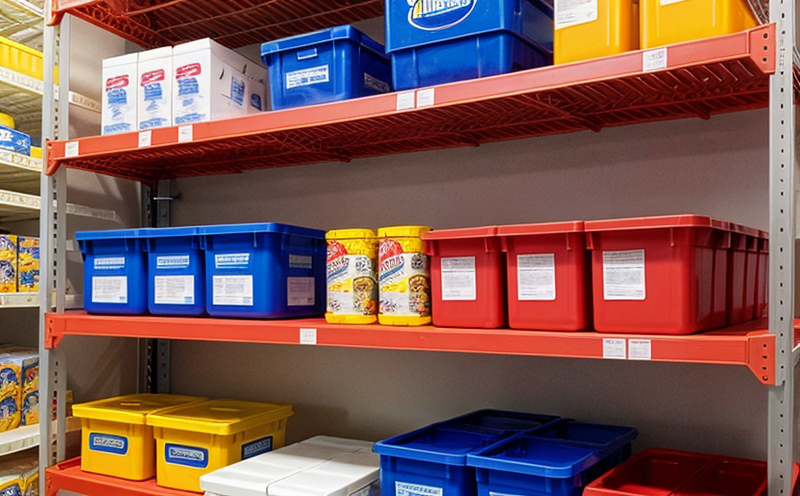ISO 101362 Accelerated Shelf Life Testing in Coffee Products
The ISO 101362 standard provides a robust framework for conducting accelerated shelf life testing of coffee products, ensuring that manufacturers can reliably predict the shelf life of their products under real-world conditions. This service is essential for quality managers and compliance officers who need to ensure that coffee products maintain their freshness, flavor, aroma, and safety over extended storage periods.
The accelerated shelf life test protocol allows companies to accelerate the aging process by simulating environmental factors such as temperature, humidity, and exposure to light. By subjecting samples to these conditions in a controlled laboratory environment, we can replicate the effects of time on the coffee products more efficiently than they would occur under normal storage conditions.
The testing procedure typically involves the following steps:
- Sample selection: A representative sample is selected based on batch characteristics and product design.
- Environmental chamber setup: The temperature, humidity, and light exposure are set according to ISO 101362 requirements.
- Initial analysis: Chemical and physical properties of the coffee products are analyzed before testing begins. This includes evaluating moisture content, fat oxidation levels, color changes, and other relevant parameters.
- Sampling schedule: Samples are taken at regular intervals throughout the test period to monitor changes in product quality.
- Data collection: All data points are carefully recorded and analyzed to determine the point at which significant degradation occurs.
- Reporting: A comprehensive report is generated, detailing the results of the accelerated shelf life test. This includes not only quantitative data but also qualitative observations about sensory attributes like taste and aroma.
This testing method ensures that coffee products meet rigorous standards for quality and safety throughout their entire shelf life. The insights gained from this process help companies make informed decisions regarding product formulation, packaging design, and storage practices, ultimately leading to improved consumer satisfaction and reduced waste.
By adhering to the ISO 101362 standard, we ensure that our tests are conducted in a manner consistent with industry best practices. This level of consistency is crucial for maintaining credibility within both domestic and international markets, as well as ensuring compliance with relevant regulations.
Scope and Methodology
The scope of this service includes the accelerated shelf life testing of coffee products using ISO 101362. This method involves exposing samples to controlled environmental conditions designed to accelerate natural deterioration processes, such as oxidation and microbial growth. The primary goal is to identify the point at which product quality begins to degrade significantly.
The methodology follows precise guidelines outlined in ISO 101362, which specifies temperature, humidity, and light exposure levels for different types of coffee products. These conditions are intended to mimic extreme environmental stressors that might occur during storage or transportation.
Once the test begins, samples are periodically removed from the environment chamber and assessed for changes in key quality indicators such as color, flavor intensity, oil content, and overall organoleptic properties. Additionally, chemical analyses may be performed if necessary to detect specific compounds linked to spoilage.
The results of these assessments form the basis of our report, which provides actionable insights into how best to extend the shelf life of your coffee products while maintaining their superior quality standards.
Industry Applications
This service has wide-ranging applications across various segments within the food and beverage sector. For instance, it is particularly beneficial for companies involved in:
- Coffee roasting: To optimize roast profiles that enhance flavor stability over longer periods.
- Packaging development: Understanding how different packaging materials affect shelf life during storage.
- Supply chain management: Ensuring consistency in product quality from production to point-of-sale.
- R&D initiatives: Identifying potential improvements or innovations aimed at extending shelf lives without compromising taste or safety.
In addition, this service can also be valuable for regulatory compliance purposes. Many countries have strict guidelines regarding the freshness claims made on labels; thus, being able to accurately predict and document shelf life through rigorous testing helps companies avoid legal issues associated with false advertising.
Why Choose This Test
Selecting ISO 101362 accelerated shelf life testing offers several advantages over other methods:
- Efficiency: It allows for quicker identification of potential problems compared to natural aging.
- Cost-effectiveness: By identifying issues early on, it reduces the need for extensive product recalls later down the line.
- Precision: The controlled environment ensures consistent results across multiple batches and production runs.
- Compliance: Adherence to international standards like ISO 101362 demonstrates commitment to high-quality practices, enhancing brand reputation.
- Data Richness: Extensive data collection enables detailed analysis of various aspects of product quality, providing valuable information for continuous improvement efforts.
- Risk Mitigation: Early detection of any shortcomings helps mitigate risks associated with poor quality control measures.
In summary, choosing this test ensures that your coffee products meet the highest standards of freshness and safety, thereby enhancing customer satisfaction and loyalty. It also plays a crucial role in maintaining competitive advantage by ensuring consistency across all product lines.





